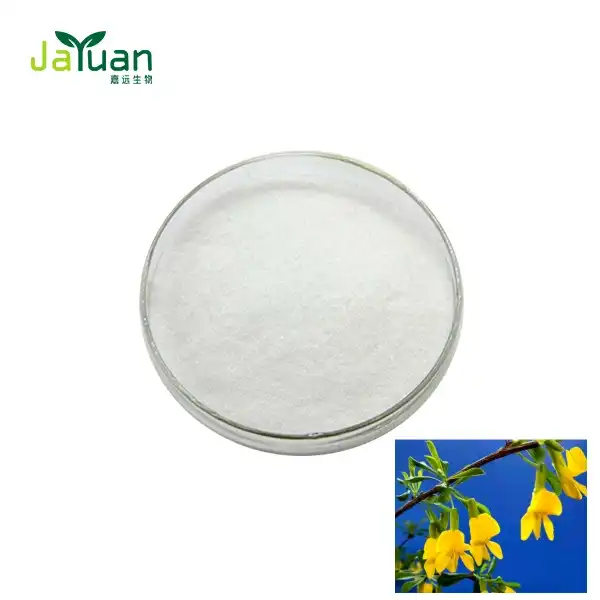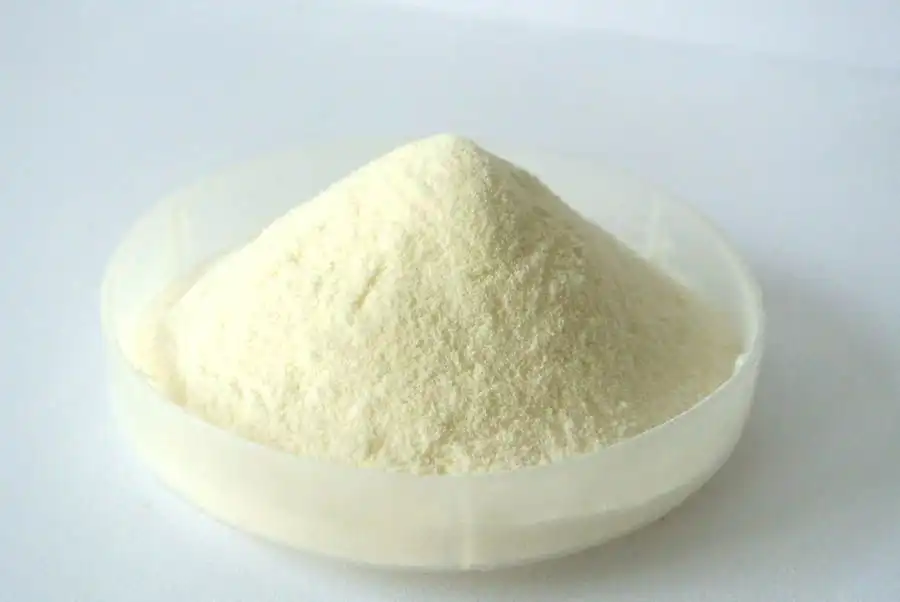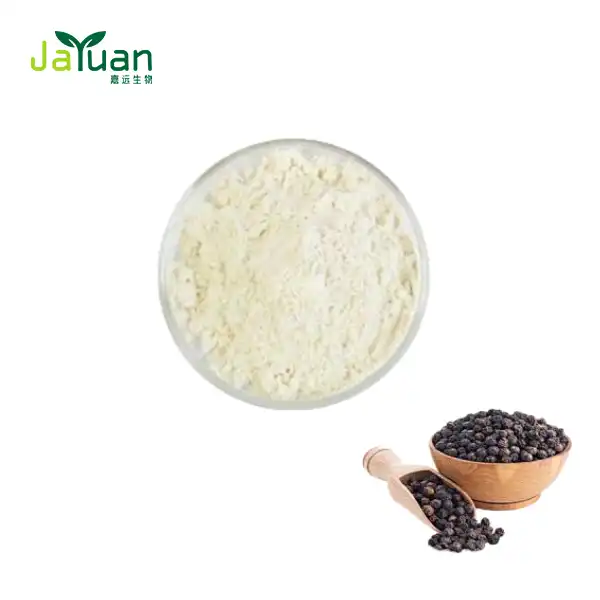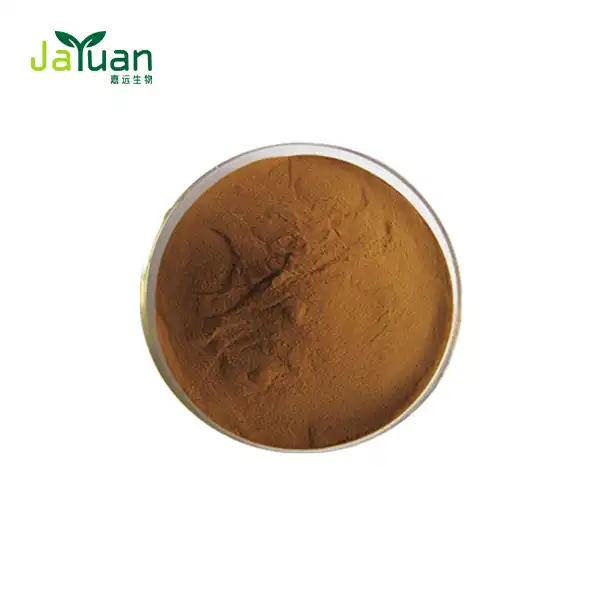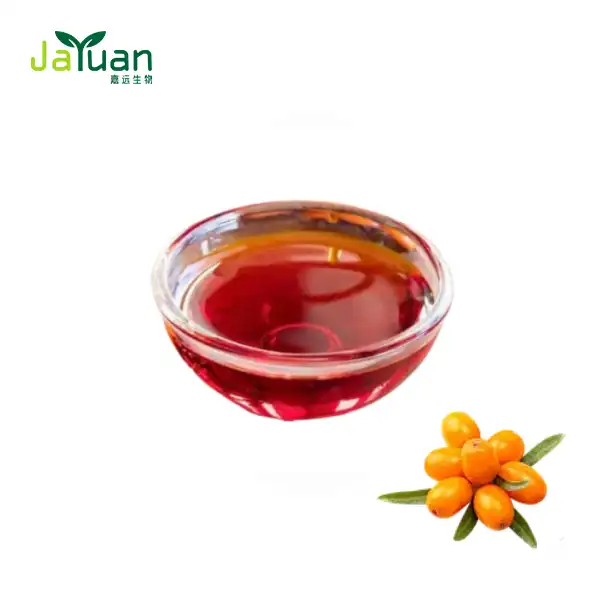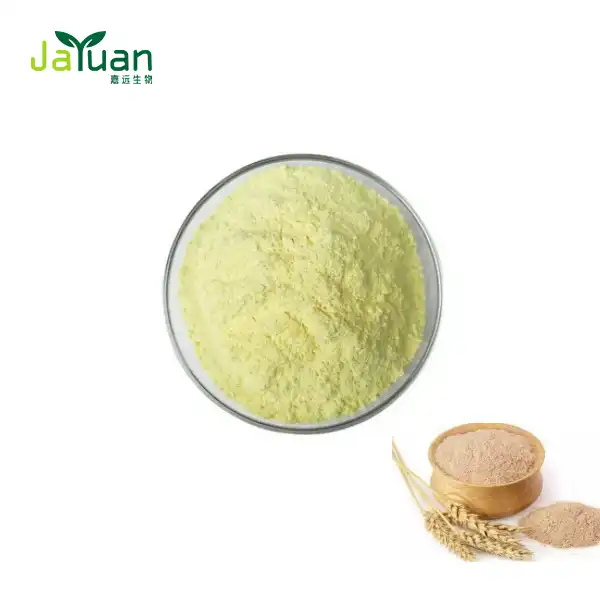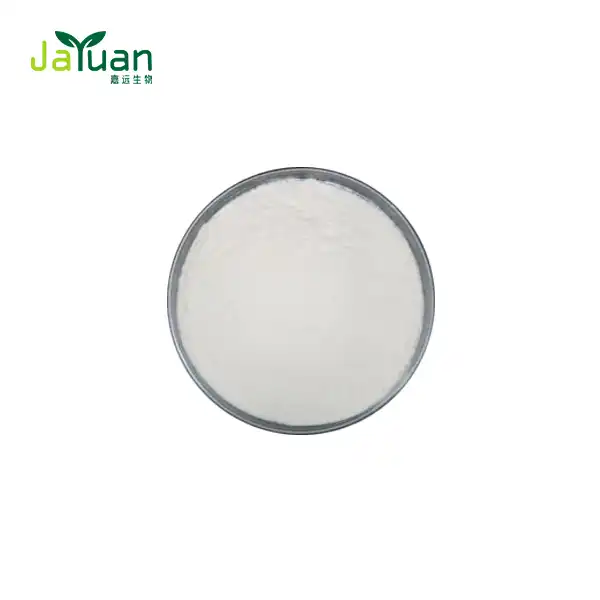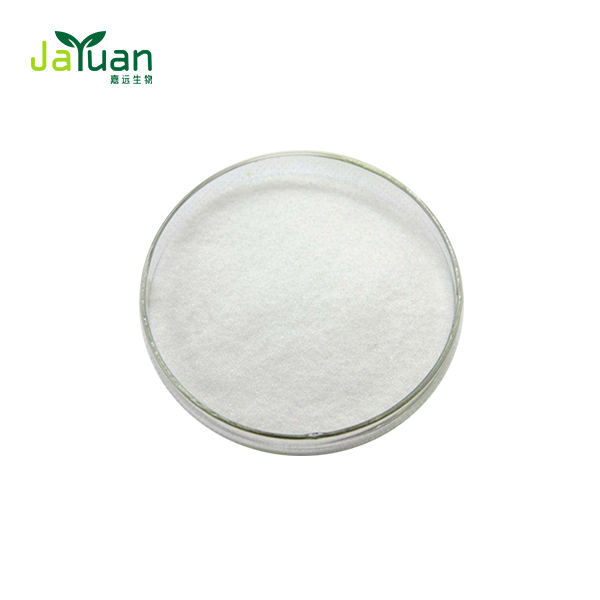Cytisine 98%
CAS NO.: 485-35-8
Molecular formula: C11H14N20
Molecular weight: 190.24
Product Description: Diagonal Prism Powder
Physical properties: Melting point of 98-99 ℃, soluble in water, ethanol, methanol, insoluble in petroleum ether.
MOQ: 500g-1KG
Our Advantages: Scalable production capacity, strict quality control, cost efficiency from integrated factories, over 20 years of experience, advanced technology, and 24/7 after-sales support.
Customized Service: Supports ODM/OEM
Payment: TT/DP/PAYPAL/DA/LC/VISA/ESCROW
Certificaions: FSSC2000/ISO2000/HALAL/KOSHER/HACCP
Delivery terms: FedEx, DHL, EMS, UPS, TNT, all kinds of the airline, international shipping companies.
Free sample is available.
We do not sell retail quantities to individuals.
Pure Cytisine 98% high quality manufacturer and supplier
Jayuan Bio is a high-tech enterprise integrating research, production, and sales, and is one of China's most professional manufacturers and suppliers of plant extracts. Our Pure Cytisine 98%, meets pharmaceutical-grade standards. We can also produce cosmetic-grade and food-grade cytisine upon request. We own over 100,000 square meters of our own plant cultivation base and have over ten partnered plantations nationwide, enabling custom-made production from the farm to the factory floor. This ensures product quality control from the source.
The company has over 20 years of experience in the natural plant extract industry and has been granted over 30 patents. We operate five GMP-compliant production lines and have independent import and export rights. We use advanced German-imported airflow milling equipment to ensure consistent performance and quality of each batch. We also implement automated production monitoring to ensure traceability at every stage of production. We maintain a Class D or higher cleanroom production facility, ensuring a pollution-free production environment. We employ a team of professional testing equipment and personnel to strictly control solvent and heavy metal residues. Each batch of our products comes with a COA and SGS reports, and we also support third-party testing. Our professional R&D team is constantly innovating production processes, always pursuing excellence in quality, and is committed to bringing you the latest and best cutting-edge products. Our products have been sold well in Europe, America, and Southeast Asia for over 20 years.

It’s backed by comprehensive certifications such of ISO, as a factory supplier we can ensure of the stability, purity, and effectiveness in every batch. Whether you're in the pharmaceutical, health product, or cosmetics industry, we provide product tailored to meet your needs. For inquiries, please reach out to sales@jayuanbio.com and sales1@jayuanbio.com.
High Purity & Potency: Our product is meticulously processed to ensure a high concentration of active compounds, ensuring maximum benefits for your products.
Certified Quality: We are committed to delivering only the best. Our products come with internationally recognized certifications, including FSSC2000, ISO2000, HALAL, KOSHER, HACCP, assuring you of their premium quality.
Customization Options: Whether you're looking for specific particle sizes, solubility levels, or packaging, we provide full customization to suit your application.
Specifications
| Items | specifications |
| Product Name | Pure Cytisine 98% |
| CAS number | 485-35-8 |
| Molecular formula | C ₁₁ H ₁₄ N ₂ O |
| Molecular weight | 190.24 g/mol |
| Purity | ≥ 98% (determined by HPLC or GC) |
| Appearance | White to off white crystalline powder |
| Odor | odorless or weak characteristic odor |
| Melting point | 152-156 ° C |
| Solubility | Easily soluble in water, methanol, and ethanol; Slightly soluble in chloroform and ether. |
Application Areas
(1) Smoking cessation medication:Cytisine is a partial agonist of nicotine receptors, which can alleviate withdrawal symptoms during smoking cessation and reduce cravings for nicotine. Its effect is similar to Champix, but at a lower cost. In Eastern Europe (such as Poland and Russia), it has been used as a smoking cessation medication for decades, with product names including Tabex ®、 Desmoxan ® Wait. Its raw materials come from natural plants, resulting in fewer side effects (which may include dry mouth, nausea, etc.), and the treatment course is usually 25-30 days.
(2) Neuroscience research:It can be used to study the mechanism of action of nicotine receptors and explore therapeutic targets for addictive diseases. And as a structural template, design new drugs for smoking cessation or neurodegenerative diseases.
(3) Agricultural use: Plantagene has insecticidal activity and has been used for pest control in organic agriculture, but its widespread application is limited by its toxicity to mammals.
(4) Traditional Medicine:Some traditional medical systems (such as Eastern Europe and Central Asia) were once used for respiratory diseases (such as bronchitis and asthma), but they are now less commonly used due to toxicity risks.

COA
| Project | Standard | Results |
| Content (HPLC) | ||
| Cytisine | ≥98% | 98.57% |
| Testing standard | Pharmacopoeia 2020, Part Four, General Principles 0512 Method | |
| Physical and chemical indicators | Conforms | |
| Identification | Off-white powder | Conforms |
| Odor | Special odor qualified | Conforms |
| Particle size | 80 mesh sieve pass rate ≥ 99% qualified | Conforms |
| Moisture content | ≤ 3.0% 0.8% | 0.8% |
| Ash content | ≤ 1.0% | 0.1% |
| Heavy metal | Pharmacopoeia 2020, Part Four, General Principles 2321 Method | Conforms |
| Lead(Pb) | ≤2.0 PPM | Conforms |
| Arsenic (As) | ≤1.0 PPM | Conforms |
| Cadmium(Cd) | ≤1.0 PPM | Conforms |
| Mercury(Hg) | ≤0.1 PPM | Conforms |
| Pesticide residue | Compliant with GB2763 National Food Safety Standard | Conforms |
| Microbiological | Pharmacopoeia 2020, Part Four, General Rules 1105 Method | |
| Total Plate Count | ≤1000 CFU/g | Conforms |
| Mold &Yeast | ≤100 CFU/g | Conforms |
| E. Coli | Non-detected | Conforms |
| Staphylococcus Aureus | Non-detected | Conforms |
| Salmonella species | Non-detected | Conforms |
| Storage method | Please store the product in a cool, dry, dark, and sealed environment | |
| The product conforms to the standard. | ||
Production process flow
This is our prodution process of Cytisine. This process ensures the stability of product quality and solvent residue below international standards from raw materials to purification.

Quality Inspection Document

Certificates
At Jayuan, we take pride in our commitment to quality and safety. Our product is manufactured in accordance with the highest industry standards and is certified by reputable organizations including FSSC22000, ISO22000, HALAL, KOSHER, and HACCP.

Patents
Jayuan has been deeply involved in the raw material medicine and plant extract industries for over 20 years, with a first-class R&D team and advanced equipment. We have obtained multiple patents.

Research and Development
Xi'an Jayuan Bio currently has over 80 employees and a professional R&D team of 30 people. Specializing in the research and testing of plant active ingredients, continuously improving and innovating extraction processes, standardized production processes, and a strong quality control management system, effectively ensuring the stability and bioavailability of product quality.

Packaging and Transportation
For pharmaceutical-grade products, cold chain transportation (2-8°C) is used, using ice packs or refrigerated trucks. For room-temperature transportation, use a light-blocking box and insulation materials to avoid direct sunlight. This effectively protects product quality and stability. With direct global access by sea, land, and air, our professional logistics team ensures on-time delivery, covering the European, American, and Southeast Asian markets
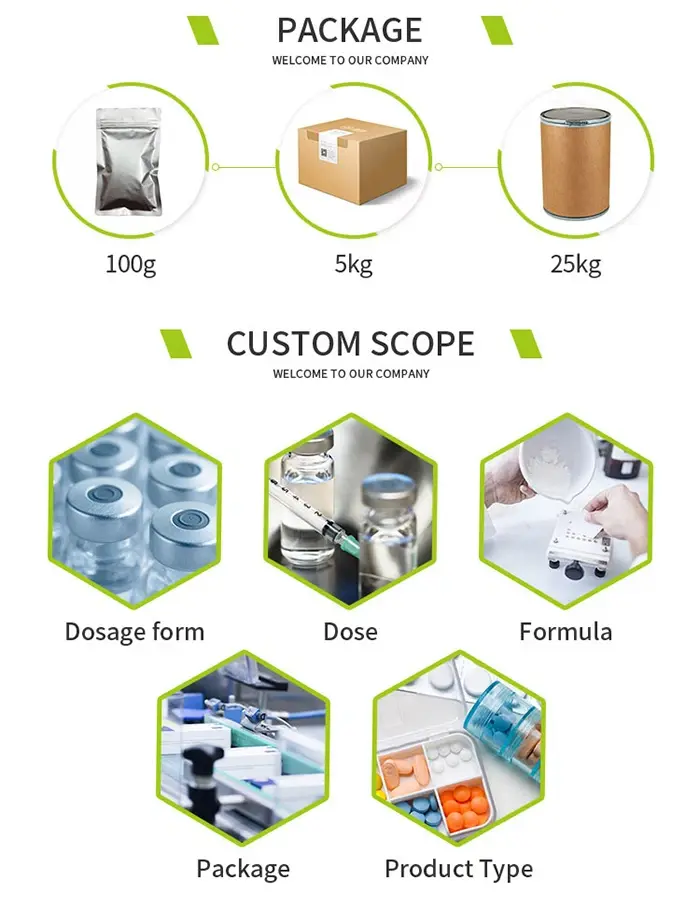
Exhibitions
Jayuan has participated in industry exhibitions such as CPHI, API, PMEC, and Vitafoods Asia for many years, showcasing its core products and latest technological advancements for in-depth discussions and collaborations with pharmaceutical companies, research institutions, and industry experts from around the world. Through these exhibitions, Xi'an Jayuan Bio aims to showcase its technological strengths and product advantages, expand domestic and international markets, seek more partnership opportunities, and contribute to the development of the global pharmaceutical industry.
If you are interested in our products or would like to discuss collaboration, please contact us immediately. We will be happy to serve you. We believe Jayuan will bring you a unique experience and surprises.
Looking forward to your feedback!

Payment
In order to meet the payment needs of different customers, we offer a variety of flexible, secure, and global payment methods, covering traditional bank transfers, modern digital payments, and customized solutions.

After-sales Service
Our responsive support team provides expert technical assistance and guidance to ensure smooth product integration.

Production Workshop
Our workshop complies with GMP standards and meets Class D cleanroom standards. Use corrosion-resistant materials such as stainless steel 316L to ensure workshop safety regulations.

Why choose us?
1. Full Supply Chain Control: We own a 50,000-square-meter natural cytisine cultivation base, equipped with advanced airflow milling equipment to ensure uniform, contamination-free product particles, achieve ultra-fineness control, and effectively enhance bioavailability. Low-temperature milling technology is used throughout the production process to effectively protect the plant's active ingredients. Intelligent production, with real-time monitoring of feed rates, ensures batch-to-batch product stability. Heavy metal and solvent residues are below international limits. Our integrated approach, from raw material cultivation to extraction and purification, reduces intermediate steps and ensures full traceability throughout the production process. This ensures a stable, cost-effective supply and supports large-volume order fulfillment, helping customers maximize profits.
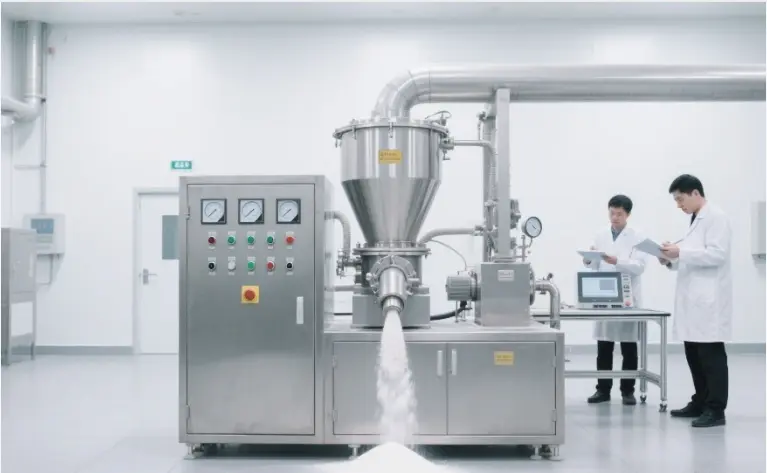
2. Standardized production process: First, preferably gorse seeds are crushed to 60-80 mesh to increase the effective contact area. They are then treated with ammonia or sodium hydroxide (pH 9-10) to release the alkaloids from the plant cells. Next, they are soaked in dilute hydrochloric acid (pH 2-3) to dissolve the cytisine salt in water. The pH is then adjusted to 9-10 to precipitate the cytisine. Finally, extraction is performed with chloroform or dichloromethane, followed by concentration and recrystallization (ethanol-water system). Purity is then determined using preparative HPLC.

3. Tertiary Purification: In the first step, macroporous resin enrichment is used to effectively remove impurities such as pigments and polysaccharides from plant extracts, significantly improving the purity of the target component. The second step is silica gel column chromatography, which is low-cost and has a high sample loading capacity. It is suitable for removing structural analogs and effectively separates structural analogs (such as N-methylcytisine) from polar impurities. The third step, preparative HPLC, is the core technology for obtaining high-purity cytisine (≥98%), particularly suitable for preparing pharmaceutical-grade standards or reference materials. Step-by-step improvement effectively improved product purity and bioavailability.

4. Impurity Analysis and Control: Solvent residue is a key indicator affecting the safety of cytisine, especially for pharmaceutical use. It must comply with international pharmacopoeia standards such as ICH Q3C and EP/USP. For solvent residues, ethanol, ethyl acetate, and other residues are tested using GC (compliant with ICH Q3C). For heavy metal residues, atomic absorption spectroscopy (AAS) or ICP-MS is used to detect lead, arsenic, and other residues (≤10 ppm). For pesticide residues, GC-MS/LC-MS is used to screen for organochlorine and organophosphorus pesticides (compliant with EU MRLs). Heavy metal and solvent residues are strictly controlled to international pharmacopoeia standards (USP/EP), meeting the high-end demands of pharmaceuticals, health supplements, and cosmetics.

5. Comprehensive and Professional Test Reports: We operate five GMP-compliant production lines, rigorously controlling key indicators such as heavy metals and solvent residues throughout the production process. Our internal control standards exceed those of pharmacopoeias such as USP/EP. We provide Certificates of Approval (COA), heavy metal test reports, and microbiological test reports. SGS reports are included with shipment, and we also support third-party testing. This ensures full traceability from raw materials to finished product, ensuring batch-to-batch quality consistency and cost advantages, helping customers maximize profits.

6. Professional Testing Equipment and Personnel: We have five complete GMP-compliant production lines, equipped with a dedicated testing laboratory and 20 professional testing personnel. From production base to workshops and testing personnel, we provide seamless integration throughout the entire process.

7. Stability and Packaging and Storage: To ensure the chemical stability, purity, and safety of cytisine during storage and transportation, we implement systematic management across multiple aspects, including packaging material selection, environmental control, and stability verification.

8. Safe Transportation: For pharmaceutical-grade products, cold chain transportation (2-8°C) is used, using ice packs or refrigerated trucks. For room-temperature transportation, use a light-blocking box and insulation materials to avoid direct sunlight. This effectively protects product quality and stability. With direct global access by sea, land, and air, our professional logistics team ensures on-time delivery, covering the European, American, and Southeast Asian markets.

9. Strong Production Capacity: Our high-quality cytisine produces 3-5 tons per month, with tons of inventory in stock, ensuring timely delivery of large orders. We provide one-stop service from sample testing to bulk delivery.

10. Customized Solutions: We offer customized packaging solutions, such as OMD/OEM, supporting a variety of packaging specifications and formats to flexibly meet different customer needs.
11. Quality Control and Release Standards: Our products are highly pure and stable, with impurity control meeting EP/USP standards. We are ISO9001 and ISO2000 certified, and meet both food-grade and cosmetic-grade standards.

Contact Us
Ready to experience the superior quality of our Pure Cytisine 98%? Contact our expert team as soon as possible, we're always here waiting for serving you.
Looking forward to your immediate feedback!
Your prompt email would be greatly appreciated!
Email: sales@jayuanbio.com sales1@jayuanbio.com
Address: Xi'an Hi-Tech Industrial Development Zone, Shaanxi Province, China

